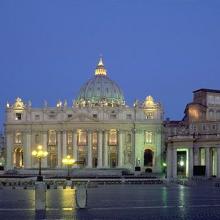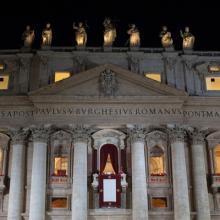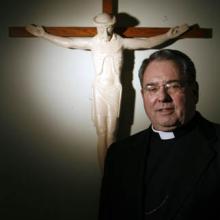Survivors Network of those Abused by Priests
Pope Francis on Nov. 11 created a new Vatican body to deal with the most serious cases of child sexual abuse and to streamline complaints against the clergy.
The Vatican said the pope would nominate seven cardinals or bishops to consider appeals from clergy accused of abusing minors in a bid to speed up the judicial process of clergy who have received an initial assessment by local bishops.
The members of the panel, or “college,” may come from the Congregation for the Doctrine of the Faith, which currently handles cases, or elsewhere in the church. Members will also be asked to deal with serious abuses of penance in the confessional.
The Vatican’s chief spokesman, the Rev. Federico Lombardi, called the pope’s proposal a “good solution” to help alleviate a backlog of cases.
Bishops accused of sexually abusing minors will still have their appeals handled by a session of CDF members at their monthly meetings.
“This is a good sign Francis is giving: He is basically saying that the CDF remains competent, and gives them an extra instrument to promptly deal with a specific type of appeals against decisions, namely recourses against administrative decrees,” said Kurt Martens, a canon law expert at Catholic University in Washington.
The immediate changes were outlined in a papal rescript, or “Rescriptum,” signed by the Vatican secretary of state, Cardinal Pietro Parolin, and printed in L’Osservatore Romano, the Vatican’s official newspaper.
The pope has adopted a hard line on clerical sex abuse and at times asked for forgiveness while lambasting church leaders more than once for protecting abusers.
When victims of sexual abuse by Catholic priests first organized into a small band of volunteer activists in the late 1980s, reports of clergy molesting children were still new and relatively few. Most were minimized as anomalies or dismissed altogether — much the way the victims were.
But today, as the Survivors Network of those Abused by Priests, or SNAP, marks its 25th anniversary at a conference in Chicago, its members can take satisfaction in seeing that its claims have been validated, and a few (though hardly all) of its recommendations have been implemented by the church hierarchy.
And instead of facing constant verbal attacks and the occasional angry parishioner spitting on them at a protest, SNAP’s members today are far more likely to receive a handshake and a word of thanks, and maybe even a donation.
SNAP’s advocacy on the Catholic scandal also helped push the reality of sexual abuse into the public consciousness to the point that victims can regularly win in courts and get a hearing in the media, and they are much more likely to come forward to tell their stories, whether they were abused by clergy or by athletic coaches or Boy Scout leaders.
Yet that success is also presenting SNAP with a daunting new challenge as it looks to the future: how to respond to a flood of new inquiries from victims from other faiths and institutions, and how to push for changes beyond the familiar precincts of the Catholic Church.
Pope Francis on Monday held his first meeting with victims of clergy sex abuse, begging for forgiveness and promising to hold “accountable” the bishops who were complicit in covering up for predatory priests.
“Before God and his people I express my sorrow for the sins and grave crimes of clerical sexual abuse committed against you. And I humbly ask forgiveness,” the pope said, according to a Vatican transcript of his morning homily.
Pope Francis’ announcement this week that he would meet with victims of sexual abuse by priests is dividing victim advocates, with some dismissing the move as “meaningless” and others endorsing it as a positive step, albeit taken belatedly and under pressure.
“A welcome and overdue change,” said Anne Barrett Doyle of BishopAccountability.org, a prominent activist pushing the Catholic Church to overhaul its policies and practices on clergy abuse.
“Good to hear Pope Francis speak out and meet survivors,” tweeted Marie Collins, an abuse victim whom Francis named to a Vatican commission to promote reforms, on hearing that the pope compared clergy abuse to a priest celebrating a black Mass.
But others said Francis’ first-ever encounter with victims — and his pledge for “zero tolerance” for abusive clerics of any rank — was simply stagecraft aimed at distracting the public from what they say are the pope’s larger failures to address the abuse crisis.
The Vatican has effectively addressed the “worldwide scourge” of clerical sexual abuse over the past decade and promoted the reporting of allegations to both church and legal authorities, a United Nations panel heard on Tuesday.
Tomasi faced intense questioning from members of the U.N. committee investigating whether the church upholds the U.N. convention against torture beyond the walls of the world’s smallest country, the Vatican City state.
The Vatican could face a wave of new sexual abuse claims dating back decades if a United Nations inquiry finds that the Roman Catholic Church has violated an international treaty against torture and inhuman treatment.
“For too long, sexual violence and acts of rape by the Catholic Church have been minimized,” said Katherine Gallagher, senior staff attorney at the New York-based CCR, after the U.N. panel that enforces the torture convention held hearings in Geneva.
A United Nations panel on Wednesday blasted the Vatican for protecting itself rather than victims of sexual abuse, and it called on the Holy See to create what it called an “independent mechanism” to investigate new charges of abuse.
The 16-page report from the Committee on the Rights of the Child accused the Vatican of “systematically” adopting policies that allowed priests to rape and molest thousands of young people over a span of decades. It also calls on the church to remove known or suspected abusers from its ranks immediately.
“The Committee is gravely concerned that the Holy See has not acknowledged the extent of the crimes committed, has not taken the necessary measures to address cases of child sexual abuse and to protect children, and has adopted policies and practices which have led to the continuation of the abuse by and the impunity of the perpetrators,” the report said.
Pope Francis on Thursday approved a major overhaul of the Vatican’s criminal laws, introducing specific offenses for child sexual abuse and leaking confidential documents.
Vatican laws against money laundering, corruption, and the financing of terrorism were updated to respond to the recommendations of the European financial transparency watchdog Moneyval. The Vatican submitted to Moneyval oversight as part of its bid to use the euro as its currency.
Under the new norms, which will go into effect on Sept. 1, the Vatican also abolished life imprisonment, substituting a maximum jail term of 30 to 35 years.
A campaign to hold former Pope Benedict XVI responsible for crimes against humanity floundered on Thursday as the International Criminal Court in The Hague threw out a case filed by victims of clergy sex abuse.
The case had been presented in September 2011 by SNAP, the Survivors Network of those Abused by Priests, and the New York-based Center for Constitutional Rights, accusing the pope and other senior Vatican officials of failing to stop abusive priests.
According to a SNAP statement, the court’s prosecutor’s office said on May 31 that the file presented against leaders of the Roman Catholic Church does not meet the “preconditions of the court” and thus “do not appear to fall within the (court’s) jurisdiction.”
Amid calls for a Vatican investigation, Newark Archbishop John J. Myers is facing fierce criticism for his handling of a priest who attended youth retreats and heard confessions from minors in defiance of a court-ordered lifetime ban on ministry to children.
At St. Mary’s Catholic Church in Colts Neck, where the Rev. Michael Fugee had been spending time with a youth group, angry parishioners said they were never told about Fugee’s background, and they questioned Myers’ defense of the priest, the subject of a lengthy story in The Star-Ledger.
“It’s complete craziness that the church can let this happen,” said John Santulli, 38, a father of two at St. Mary’s. “I’m a softball coach, and I need a background check just to get on the field. Every single person I spoke to today said, ‘Oh my God. I didn’t know about this.’ It’s incomprehensible.”









